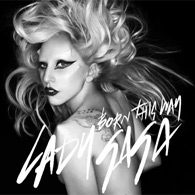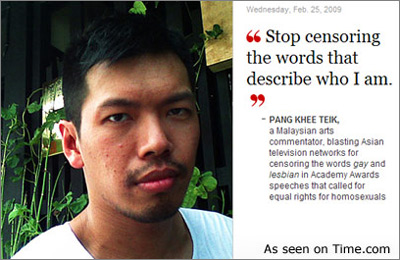My mama told me when I was young
We are all born superstars
She pulled my hand and put my lipstick on
In the glass of her boudoir
"There’s nothin wrong with lovin who you are"
She said, "cause he made you perfect, babe"
"So hold your head up girl and you’ll go far,
Listen to me when I say"
I’m beautiful in my way
‘Cause God makes no mistakes
I’m on the right track baby
I was born this way
- Lady Gaga, "Born This Way"
My mama NEVER told me when I was young that we were all born superstars. It’s okay, I had my music for that. And I am happy that today’s generation of young lesbians, gays, bisexuals and transgenders (LGBTs) have Lady Gaga to tell them "there’s nothing wrong with lovin who you are". When people around you just don’t understand, the radio is your best friend.

Last week, the Associated Press asked me to comment on the censorship of the above song. It seems that the line "No matter gay, straight, or bi, lesbian, transgendered life, I’m on the right track baby" from Lady Gaga’s Born This Way has been deliberately garbled by Malaysian radio stations. I was annoyed to learn of this.
According to AP’s report: "AMP Radio Networks, Malaysia’s top private radio operator, said the precaution was due to government restrictions against songs that might violate "good taste or decency or (are) offensive to public feeling."
"The particular lyrics in ‘Born This Way’ may be considered as offensive when viewed against Malaysia’s social and religious observances," the company said in a statement to The Associated Press. "The issue of being gay, lesbian or (bisexual) is still considered as a ‘taboo’ by general Malaysians."
A taboo, darling, is made and sustained precisely by such censorship. Expose it to light more often and it appears less shadowy. Sex, death, religion, interracial love, special rights, royalty — I think the real reason we have so many taboos is because Malaysians just love them taboos.
If the companies are really worried about taboos, they shouldn’t even play the song or screen Glee or Ugly Betty. Playing these songs or shows, entertainment companies simply want to attract as many audience members as possible that they could sell to advertisers. Once they have their numbers, they really can’t be bothered about the message. It’s like running a country and editing the constitution as they please, or having a government that cannot be questioned, or allowing a holy scripture but banning the word God…
With such brilliantly arbitrary guidelines, the breaking of which results in a fine of up to RM50,000 (US$16,500), the government effectively forces radio stations to become overzealous in interpreting what constitutes as being "offensive to public feeling" — just to be on the safe side. But how safe is safe? How much integrity will our media sacrifise in fulfilling a ridiculous guideline? The answer is: What integrity?
By claiming to be playing our songs, what these stations are doing is getting LGBTs in Malaysia to sit eagerly in front of the radio only to slap us across the face by telling us we are offensive. For that reason alone they don’t deserve our patronage. Not just from LGBTs, but all Malaysians who have friends and family members who are.
If little blue birds fly, why oh why can’t I?
Growing up gay is, to borrow from pop songs, a one way ticket to the blues, a total eclipse of the heart, a constant craving. Friends make fun of you, family members gossip about gay relatives and church members keep reminding that people like you will go to hell.
When there was no one with whom to share the burdens of my youthful heart, I turned to the radio. Barbra assured me that "people who need people are the luckiest people in the world" while Freddie said "we are the champions, my friends, we’ll keep on fighting till the end". Strangely enough, when I succumbed to the pressure of TRYING to be straight, I took these songs to mean: the day when I need a girl I will be the luckiest person in the world, and the day I have a wife and 2.4 kids I will be a champion. For 12 years, I kept yearning like the Little Mermaid to be "wandering free, wish I could be, part of that world."
When turning straight was clearly impossible and pointless and utterly painful, I started to realise that perhaps I could only be free if I learned to be a part of my own world. All of a sudden, those songs by Barbra, Queen, Elton, Madonna, ABBA, Whitney and Judy spread their little blue bird wings and flew me over the rainbow. These songs guided me back to the yellow brick road, helped me embrace my inner dancing queen, enabled me to find the greatest love of all. (Okay, I am showing my age, so what?!)
And that’s why we need gay anthems. We don’t even need the songs to spell out G-A-Y for them to be gay anthems. Years of learning to send out signals to other lifeforms of the similar emotional frequency have trained us to speak in codes. Years of having no representation in the media have trained our ears to listen to the codes (even when the codes are unintended).
Who else could Siti be singing for when she confessed "diriku hanya insan biasa, miliki naluri yang sama" but to those who had to question their insan-ness (manliness) and been made to feel their naluri (instinct) is TIDAK sama (not the same)?
Of course we can’t deny straight folks their straight interpretations of these songs. But neither can they deny us our clearly more fabulous interpretations. The fact that both straights and gays can adapt these songs to their diverse experiences is part of the special mutant powers of great artists. These singers have forced us to realise that seemingly irreconciliable as we may be, we are united by their music, that we are actually seeing ourselves through words meant for each other, and vice versa.
One of the important roles of the media in any society is being a platform for marginalised voices and creating understanding — not to perpetuate ignorance and hate. Lady Gaga was attempting to address this very thing in her song. How dare they play that song and cut out its shining heart.

Stop censoring the words that describe who I am
Across the world, not merely the West but also in The Philippines, Taiwan, China, India, and Nepal, policies are slowly but surely becoming fairer to LGBTs. As artists take bolder and bolder steps to speak on behalf of the voiceless, and audiences encounter more and more gay representations in the media, the public sees there’s nothing to fear and becomes more accepting, while LGBTs sees there’s nothing to fear and become more open to live their lives.
Over the last few years, we have invited the wonderful gay characters of Glee, Queer Eye for the Straight Guy, Brothers & Sisters into our living rooms as if they were friends — friends whom we gag once in a while. Showing gay characters but cutting the word "gay" is, as Amir Muhammad pointed out, a typical Malaysian hypocrisy: we are okay knowing there are gays as long as they pretend not to exist (and allow us to make jokes about them, blackmail them, fire them from work, kick them out of homes).
Two years ago, when Astro cut the words "gay" and "lesbian" from the Oscar acceptance speeches of Sean Penn and Dustin Lance Black for their work in the film Milk, about martyred gay rights activist Harvey Milk, I wrote:
"For me, this act of censorship defeated the very victory won by these two men. The two moments of silence rang out like the gun shots that killed Harvey Milk.
"By its act of censorship, Astro had sent a message to all Malaysians that gays and lesbians are still shameful things to be censored from the public’s ears. As a gay man, I am truly offended.
"Stop censoring the words that describe who I am. I am a Malaysian. I work hard for the right to be here, and I work hard for the right to love, just like everyone else."
My letter was picked by AP then and received international attention. But nothing has changed since. Except that I have cancelled my Astro subscription.
The reasons for censorship have always been the same cowardly reasons: that they are protecting public sensitivities, that LGBTs are offensive to public feeling.
Are LGBTs not part of the public and don’t we have feelings too? Are minorities not citizens? Who needs protection more, the majority or the minorities?
What is truly offensive is seeing how perverted democracy is in Malaysia. Watching how some radio stations and government machineries pander to the majority at the expense of minorities makes me sick. This is what happens when "public" is conveniently defined NOT as the whole constituency but merely the major part of it. The state does not seem interested in serving the people but in serving just enough people to stay in power.
The problem is not simply homophobia. The problem is the systemic disregard for the constitution, human rights, justice and equality.
But it is not all bleak. Since running Seksualiti Merdeka, I have been interviewed on BFM radio, on local magazines, websites and newspapers, talking about LGBT issues. We thank these editors and producers for having the guts to do what is right.
Contrary to opinions, giving a platform to LGBTs is not a sign of the erosion of Malaysia’s morality. Malaysia’s morality has already been eroded beyond recognition by corrupt politicians, unjust legislators and criminal police. Playing these songs intact could however signify Malaysians rediscovering our humanity once again.
Am I being bitchy because I just want to enjoy my songs in full on the radio? No, I protest these censorships so that young LGBTs growing up in Malaysia won’t hear the silencing cuts and despair that their country hates them. I hope that they can hear instead the words meant for them and know they are not alone.
We just want the same thing as everyone else: to love, be loved and have our songs played on the radio.
No matter gay, straight, or bi,
Lesbian, transgendered life
I’m on the right track baby
I was born to survive
No matter black, white or beige
Chola or orient made
I’m on the right track baby
I was born to be brave
Pang Khee Teik is the co-founder of Seksualiti Merdeka and the co-editor of Body 2 Body: A Malaysian Queer Anthology. The column was first published on loyarburok.com.
